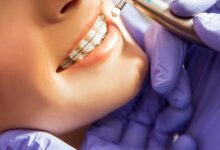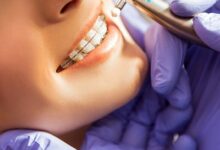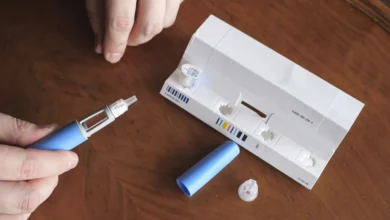
Exploring the Pros and Cons of Dentures
It’s an older person’s worst nightmare to lose teeth. As we age, our teeth deteriorate, and we become more susceptible to infections and tooth decay. Many older adults have found relief from dentures.
But are dentures ideal? Dentures are discussed in this article, along with their benefits and drawbacks. This will assist you and your loved one to determine the pros and cons of dentures.
Table of Contents
What Are Dentures?
Dentures are removable dental prosthetics custom-made by dentists to replace missing teeth and gums. Dentures are removable dental prosthetics that can replace some or all of your upper or lower teeth.
Dentures of any type will be tailored to your mouth’s unique shape and coloration to look just like your natural teeth.
What Exactly Do They Consist Of?
Dentures used to be made of porcelain or plastic for replacement teeth, but today’s dentures are often crafted from a durable resin. When compared to real teeth, the materials used to create denture teeth are noticeably more brittle, so they can quickly fracture or crack if mishandled.
This material wears down much faster than real teeth, so dentures made of it need to be replaced every five years or so.
The base of a denture, which holds the false teeth in place and looks like gums, is usually made of the same resin as the teeth or a more flexible polymer that fits snugly against the gums.
Putting in False Teeth—Why Bother?
Dentures not only improve the look of a smile that shows missing teeth, but they also help keep the mouth healthy by keeping the tissues and bones around the lips and cheeks from breaking down.
Dentures let you eat everything that needs to be chewed, so you can keep up with your normal diet and meet your nutritional needs.
Last but not least, dentures can be used to replace teeth that have caused a lot of discomfort or oral health problems due to rotten roots or significant damage.
Dentures are a good way to replace missing teeth and get rid of the problems they cause. You may check here if you consider dental implants.
Types of Dentures
Partial Denture
Partial dentures can fill up gaps where many teeth are absent. Dentures are false teeth that are affixed to a gum-or pink-colored plastic base, which may or may not have a metal structure to keep them in place.
Full Dentures
In contrast, full or complete dentures are a whole set of (removed) dentures that replace an entire arch of missing teeth. Dentists often recommend “over dentures,” which are designed to fit “over” your remaining natural teeth, if you still have any.
Pros and Cons of Dentures
When is it better to get dentures than to try something else? Investigating the dentures’ pros and cons:
Pros
False Teeth Have a Natural Appearance and Feel
Your dentures will fit and feel normal after a short period of getting used to them. No one will even notice that you’re sporting false teeth.
Putting in Dentures Takes Little Time
Comparatively, denture procedures take less time than alternatives like dental implants. You will need to schedule multiple appointments with your dentist over the course of several months if you want to have implants.
On the other hand, dentures can go from start to finish and be placed in your mouth in as little as two to six weeks. A dentist that specializes in urgent care can often provide a new set of dentures within 24 to 48 hours.
They Help Stabilize a Drooping Jaw
Jaw and mouth muscles naturally decline with age. With dentures, your mouth, jaw, and cheekbones will look more real because they support the muscles in your jaw and mouth.
Dentures are Cheap
Replacement dentures are among the least expensive options for tooth loss. In addition, doctors can legally recommend them to people of any age.
Make Eating Easier
When you don’t have enough teeth, it can be hard to eat certain things. Apple slices and nuts are acceptable after the initial period of adjustment.
Denture wearers should consult a dentist for advice on what kinds of food are safe and how to eat them; one good method is to break down larger chunks of food into more manageable sizes.
It Makes You Look Younger
Dentures restore the facial structure lost due to tooth loss. This will give your chin and cheekbones a more defined look, giving you a more youthful and vibrant appearance and allowing you to radiate an air of assurance.
Restoration of Smiles
Dentures repair your smile and boost your self-esteem by acting and looking like natural teeth.
Cons
Dentures Might Not Be a Long-Term Fix
Dentures should be replaced every 5–8 years at the most. This is because the shape of your face will change over time, which could make your current dentures useless.
Some people report that they lose their sense of taste after getting dentures.
Dentures May Require Regular Refitting, Which Can Be a Hassle.
Adjusting dentures on a regular basis may be necessary to provide a comfortable fit. The mouth and lips can get inflamed from constantly being irritated by poorly fitting dentures, a condition called stomatitis.
New Dentures Still Need Time to Acclimate
Getting used to dentures can be challenging at first. You should factor in extra time for eating and talk because of them. Your dentist can provide methods for quickly adjusting to them.
You can still eat, but your sense of taste may be impaired. The upper palate, which helps with taste and smell, is covered by your denture. Dentures can leave a nasty taste in your mouth and contribute to poor breath if they aren’t cleaned properly.
With Dentures, the Gag Reflex May Become Ingrained
Some people may experience this if they have trouble adjusting to their dentures. Because of this, you might not be able to sleep with your dentures.
Dentures that are too big for your mouth can be uncomfortable and even make you gag if they poke the roof of your mouth or the back of your tongue.
Infections Can Develop on Dentures
The dentures must be ill-fitting for this to occur. Dentures that don’t fit right can cause yeast infections because yeast grows well in warm, moist places like your mouth.
Some People Have Reactions to Dentures
It is possible for dentures to aggravate the patient’s gums and teeth. Possible outcomes include sensitivity to the substance or even abscesses from infection. Your dentist can write you a prescription for antibiotics to treat this.
Individual Needs and Choices To Determine Whether to Have Dentures
There are pros and cons of dentures, like being cheaper up front and not needing to be taken care of every day.
Dentures can be uncomfortable and require some getting used to, and they may also need to be replaced sooner than other options such as implants. Ultimately, the decision of whether or not to get dentures depends on the individual’s specific needs and preferences.
Visit again soon to read more posts about lifestyle topics.








